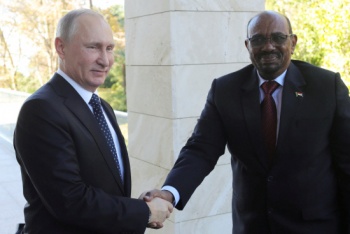Here’s Why Russia Might Set Up a Red Sea Base in Sudan

Long-serving Sudanese President Omar al-Bashir invited the Russian military into his country during his historic visit to Moscow last week, stating that Sudan needs protection from an American Hybrid War plot to “Balkanize” his rump state into five separate ones following the 2011 secession of South Sudan. In the course of the conversation, he also said that Sudan is requesting Russian assistance in upgrading its armed forces, and that the geostrategically positioned state could function as Moscow’s “key to Africa” if the two sides decide to take their partnership to the strategic level.
Sudan’s location is indeed a pivotal one because it’s located at the intersection of North and East Africa, and it also has crucial maritime-mainland connectivity potential due to its location on the western shores of the Red Sea and China’s New Silk Road plan to build a trans-Saharan railway from Port Sudan to the Chadian capital of N’Djamena in eventually facilitating trade between West Africa and the People’s Republic via this future route.
Another point of geopolitical significance in favor of a potential Russian base in Sudan is that Khartoum is advantageously located between the rival states of Egypt and Ethiopia and therefore in the most logical role to mediate between them. The inclusion of Russia into this format could endow Moscow with the unparalleled potential to “balance” between them and their feuding GCC partners, seeing as how the “Gulf Cold War” has recently spread to the Horn of Africa through the pro-Egyptian UAE’s military deployments in Eritrea and the self-declared statelet of “Somaliland” while Qatar has succeeded in patching up its relationship with Ethiopia, all of which is centered on Addis Ababa’s ambitious plans to build a controversial dam on the Blue Nile river. Through its prospectively enhanced partnership with Sudan, Russia could therefore manage to mediate not only between Egypt and Ethiopia, but also the UAE and Qatar as well, thereby fulfilling the 21st-century “balancing” role being advanced by the “progressive” faction of Moscow’s Ministry of Foreign Affairs.
The setting up of a base in Sudan would therefore allow Russia to complement its rapprochement with Saudi Arabia by giving it a regional stake in this new theater of the “Gulf Cold War” between the Kingdom’s allies and Qatar, as well as enable it to competitively reenter the realm of African affairs following its rapid retreat at the end of the Old Cold War. Russia would in essence be expanding its post-“Arab Spring” influence in North Africa further south along the Red Sea in approaching East Africa, which provides a strategic gateway to eventually embracing Ethiopia and establishing a presence along China’s Sahelian-Saharan Silk Road to West Africa. All in all, it would make perfect sense if Russia followed through on President Bashir’s proposal and built a base in Sudan, as this would be a very low-cost but high-yield move that strategically embodies a win-win outcome for the Multipolar World Order.

The post presented is the partial transcript of the CONTEXT COUNTDOWN radio program on Sputnik News, aired on Friday Dec 1, 2017:
Andrew Korybko is an American Moscow-based political analyst specializing in the relationship between the US strategy in Afro-Eurasia, China’s One Belt One Road global vision of New Silk Road connectivity, and Hybrid Warfare.
Featured image is from thesundaily.my.

